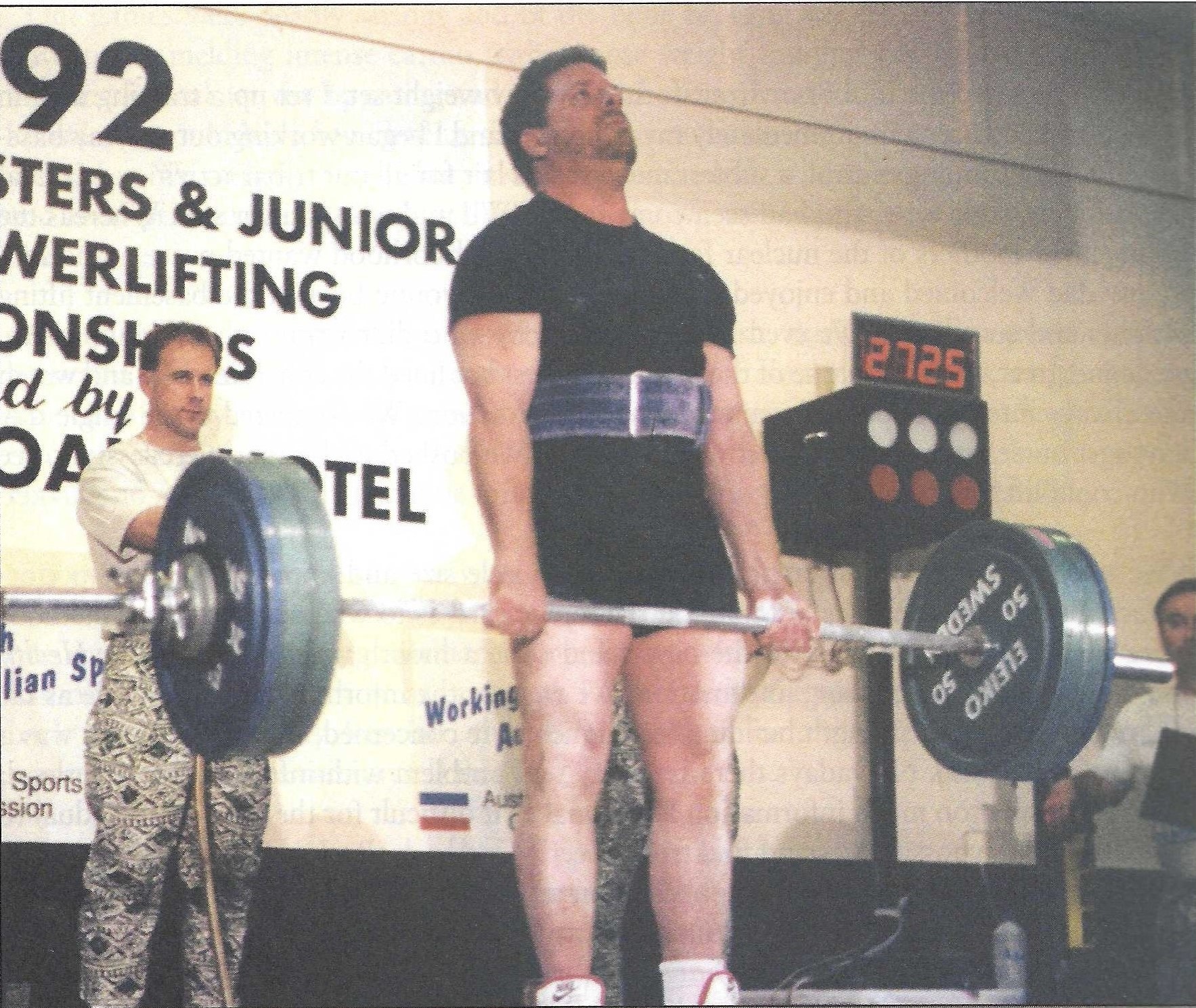
Here I am winning the IPF World Championships as a master lifter in Australia in 1992. This is my opening 272.5 kilo deadlift. I weighted 212. I had lost 13 pounds on the trip and lifted just enough to win. I was sick with a horrible sinus infection. My head clogged with thick, green mucus. I ran a 100 degree fever and was told not to lift. I had squatted 704, benched 374 (without a shirt) and deadlifted 683 to secure a spot on the World Team. I was 42.
I commenced my own transformational odyssey in 1962 when at age 12 my Irish father bought me a 110 pound set of weights for Christmas. I wanted to transform myself from what I was - an average boy - into what I wanted to be - a muscular giant. I was a daydreamer, a comic book reader, a superhero worshipper and in my mind's eye I would visualize myself transformed into Herculean proportion.
As a preteen I read Greek, Roman and Norse mythology and became a sport idolater. I wanted to become larger than life and instinctively sought out the tool that would enable me to achieve my imaginary physical goal: a barbell. My extremely supportive father enabled me to remake myself by purchasing the weights. He was a widower who worked long and hard and because of his work schedule I grew up with a lack of parental support.
Being a baby boomer, I had lots and lots of neighborhood mates and cohorts. Preteen males, we formed a roving tribe of "lost boys" and we actively and enthusiastically engaged in all types of organized athletic games. In those days parents sent children out to play; mothers particularly wanted the boys outside to preserve their sanity. Every single day we had enough male participants to form full football or baseball teams. The younger boys stood on the sidelines, anxiously awaiting their turn to be rotated into these massive sandlot games.
Once I obtained the too of my transformation, my weight set, I set up a training area in my unfinished basement. Immediately my comrades and I began workout out and my basement became training central, a subterranean wolf's lair for all our tribal activities. My Dad was a lonely, stoic type who had seen combat in WWII and won a silver star. Whereas the homemaker mothers of the nuclear families in my neighborhood wanted peace and serenity my dad welcomed and enjoyed the beehive buzz of young boys in the basement lifting weights and socializing. We even had guys come by who didn't train; they would arrive, meet and greet, then sit on one of the picnic benches that lined the concrete walls and watch the always intense, apparently entertaining, lifting action. We competed every single day amongst ourselves and always strove to improve. We pushed each other mercilessly to see who could lift the most.
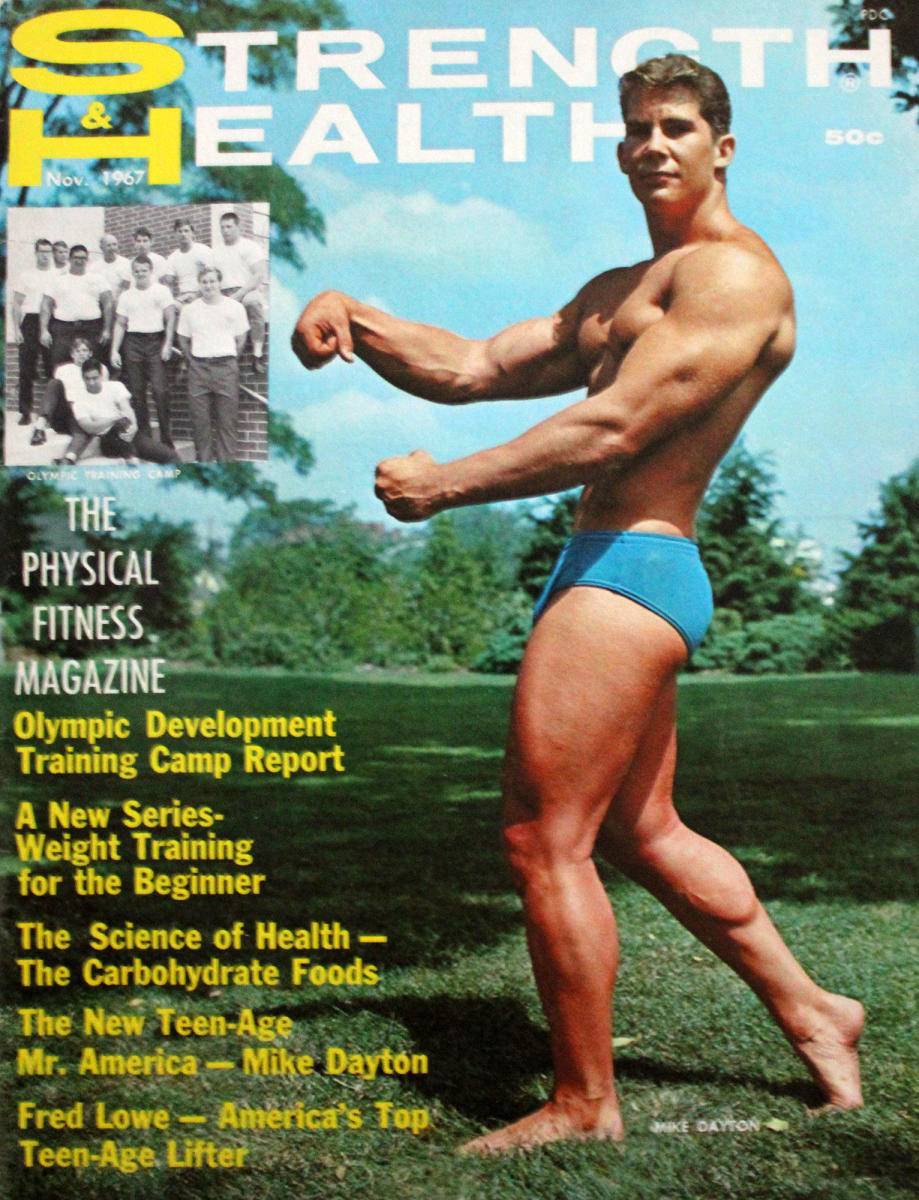
We sought increases in strength, increases in muscle size and improved athletic performance. Progress became the benchmark, the report card as to whether of not our methods were working. I would walk to the newsstand once a month to buy Strength & Health muscle magazine for training information. We were in the informational Stone Age as far as bodybuilding and strength building techniques were concerned. In retrospect this was a blessing in disguise. Nowadays there is a very real problem with informational overload; there is literally too much information and it makes it difficult for the serious individual to sort through the possibilities and find truly effective methods. Back in those days there was very little confusion. The lack of sophistication and lack of choices (regarding exercise theory, modes, equipment and tactics) turned out to be an absolute advantage.
What information we found tended to be sound. The lack of choice kept us focused on the things that mattered: we lifted hard; we lifted heavy and we lifted often. We used basic barebones barbell exercises because we had no other equipment. We ate like young colts because we were young colts. The copious calories we continually ingested kept us anabolic and in a constant state of Positive Nitrogen Balance (PNB) though we had no earthly idea what anabolism or PNB were or why it was beneficial.
The huge amounts of food we ate caused us to recover quickly from the eternal pounding we subjected our bodies to. As a direct result we grew muscle and became inordinately strong. Fat kids, back in the day, were the exception; nowadays they are the rule. Our young metabolisms were akin to nuclear reactors: we could eat anything without consequence. We participated in innumerous athletic activities, both organized and informal. Our cardio was simply a natural outgrowth of our eternal participation in football, basketball, baseball and wrestling. We thought nothing about running for miles or biking, for hours to get where we needed to go.
Our games were deadly serious and of the bone-bruising variety. We were athletic, kids unwittingly melding, intense cardio with intense weight training and "supporting" all the intense physical activity by eating and eating and eating. In retrospect the area that modern knowledge could have benefited us the most was nutrition: we ate too much saturated fat and sugar. We were ignorant idiot savants; primitive kids who came up in primitive times and used primitive tools and primitive methods, we were spared the curse of too many options.
Raised without any feminine counterbalance in a harsh, stark masculine environment, I naturally evolved into an alpha male. I was never a follower. I was the leader and the schemer, the guy who got the games organized and the guy who other guys looked to for the next move. I never demanded it. My status was bestowed upon me by the others. Having no mother or any feminine influences, I unwittingly became Spartan boy.
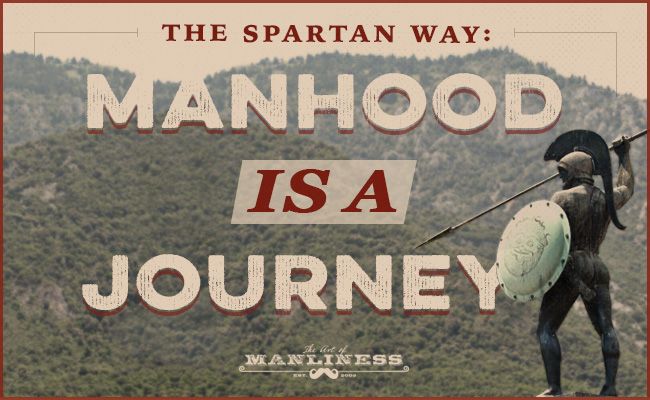
I was popular yet I never had any problem being alone or by myself. My wife says I was raised by wolves and in some ways that is dead on accurate. In my pre-driving years, if no one was around or nothing was happening, I might shoot 500 baskets or bounce a tennis ball off a street curb with great precision. I could make the tennis ball rebound fifty feet back and shoot twenty feet into the air. I would spring and leap to catch the crazed rebound. I could entertain myself this way for hours.
Luck and circumstance conspired to catapult me into adult athletic competition at a very early age. I entered high school at age fourteen, the same year a new teach arrived. This guy was a bon vivant Italian Wildman named Roy Patmalnee. He started a weightlifting club and my wild boy tribe showed up en masse and simply took over. As Sonny Barger once told Ken Kesey when asked how Hells Angels were selected, "We don't select 'em, we recognize 'em." My crew and I were recognized immediately.
We were not suburban pussies; we were street toughs who fought with each other often and swore and smoked and pushed each other into the creek for no reason. We'd already made phenomenal physical progress. Roy looked like Robert De Niro and treated us like mates, not like children. He rubbed his hands gleefully and unleashed us on other school boys. He began trucking us around to intramural Olympic weightlifting competitions. As a team we went undefeated, eventually winning the Eastern Regional United States high school team title. Other teams would compete in cute uniforms and bring cheerleaders. We'd show up with our hair greased back with Brylcream, wearing black leather jackets and Chuck Taylor high top shoes. We made over passes at the cheerleaders. We were aggressive and physical. We were primordial archetypes, "Here little man; hold my 1st place trophy while I French kiss your cheerleader sister."
Soon the "basement boys" were entering adult male Olympic lifting competitions. Suddenly we were comrades in arms with adult men and this accelerated the maturation process of already mature youngsters.
There was a ferocious Olympic lifter named Robert Lancaster who went to Howard University and later became a fighter pilot. He lifted at the time in the 181 pound class. Roy entered our team into the DCAAU Potomac Valley Regional Senior Men's Championships in order for us to get bitch-slapped in open men's competition. "This mauling will be good for you." I remember him telling us in a philosophic moment during the van ride to the meet.
I was given a life lesson that day, one that still serves me well. It was a demonstration of the relationship between muscle strength and muscle size. We were at the competition beforehand preparing to weight in when AAU President Pete Miller excitedly said, "Marty! Hurry! You've got to see this!" As I followed, Pete explained, "Hey Marty, have you ever wondered why Robert Lancaster can lift so much more that you?"
Before I could answer we turned the corner into the men's locker room, "That's why!" Pete pointed at Bob stepping down off the scales in a pair of shorts looking positively Herculean, like Arnold Schwarzenegger on his best day. I turned to Pete and said, "DUH! Of course he can out lift me! With those massive muscles and that low body fat percentile, next to him I look like a point guard or a baseball second baseman. I got to get a lot more muscle and lose a lot of body fat if I'm going to look and life like Lancaster." That was a profound formative moment for me.
The functional muscularity Lancaster displayed that day became my l lifelong physical benchmark. Lancaster's physique had function. He could clean and jerk 410 when the world record was 413 and at 5'8" he could slam-dunk a basketball.
Roy had been insistent that we undergo this trial by fire. We were scared shitless, ready to pee our pants. Lancaster was in my division and his degree of dominance created the "flee" phenomena as grizzled veterans in the know avoided his weight division. At the competition I pressed 215, snatched 195 and clean & jerked 260 weighing 171. Bob missed all three of his presses with something like 315 and was out of the competition. I ended up beating the remaining lesser lifters and won the Senior Men's title at age 14 to become the youngest winner in the history of the DCAAU. To my coach and my mates, It was as if I had miraculously beaten Cassisus Clay or run 85 yards for the winning touchdown in the SuperBowl.
I became a boy sensation. Needless to say this lucky win fired me up and caused me to redouble my efforts. I went on to win my first National Teen title at age 17, pressing 260 and snatching 225. Both were AAU National Junior Olympic records at the time. I cleaned & jerked 315, but was disqualified for "pressout." I dead-hang cleaned 295 for a triple weighing 193 at age 18. I was a holy terror and my status in the male community could not have been higher. When we got our drivers licenses, our whole world changed. We rode around in 400 horsepower muscle cars without seatbelts smoking Marlboros, drinking booze and throwing the empties out onto people's lawns. We trained hard, but now drank, smoked fought and chased women who didn't run away too far or too fast. As Balzac noted in Cousin Bette, "All men are conscious of a woman's susceptibility to pugnacious masculinity." I personally can attest to the validity of that aphorism.
i had zero interest in high school studies. I was struck hard by wanderlust and romantic ideas about travel. As soon as high school was over, I hit the road. The lone wolf alpha male left home on good terms as soon as I turned 18. My dad remarried and I was happy for him. I hitchhiked back and forth across the country three times before I turned 20 and lived in a commune for many years. It was the sixties and I was a free spirit, a restless youngster who made male friends easily. I ended up in Portland, Oregon living in the twilight world of professional musicians and dope dealers.
I eventually ended up back in Maryland and got deeply involved with martial arts for five years. I studied under an internationally famous master of the Chinese "internal" martial arts, Robert Smith, a senior student to T'ai Chi God, Chen Man Ching. I became immersed in that world, but it was not my world and eventually I came full circle and got back into competitive lifting at age 29. Within 11 months of commencing powerlifting I squatted 600 raw weighing 198 pounds. I began writing articles on weight training and was published right away. I had always been a voracious reader and as a teen had been introduced to Hemingway, Conrad and Jack London. Getting published caused me to broaden my literary horizons. I had the good fortune to come across the Russian short story writers. They were the perfect mentors for a guy who wrote magazine articles. I needed to tell my training tales in 1,500 to 2,500 words and the plain-speak short stories of Turgenev, Tolstoy and Chekhov (to a lesser degree Dostoyevsky) gave me a template for my own Iron Tales.
Most people hear "Russian Literature" and mistakenly think it dense and obtuse akin to wading through Emanuel Kant's "Critique of Pure Reason" or James Joyce's "Finnegan's Wake." Not so. The Russian Masters were plain-speak writers who told their tales quickly, efficiently and with great economy and precision.
I stumbled across Turgenev's "A Sportsman's Notebook" early on and his compact density and passion for his subject matter made him my article writing mentor. Tolstoy's "Hadji Murid" and Dostoyevsky's "The Gambler" provided further literary benchmarks for my own tales. Later Anton Chekhov had a huge impact on me: his ability to underplay, his subtleness, his humanity, his humility, everything about the man moved me deeply. I read a quote of his I use to this day as a guideline. "One should write so that the reader requires no explanation from the author. The actions, conversations and meditations of the characters need be sufficient." I took that to heart. In the Iron World where I lived there were plenty of great characters and I needed to let them speak, unimpeded, without any of my feeble embellishments.
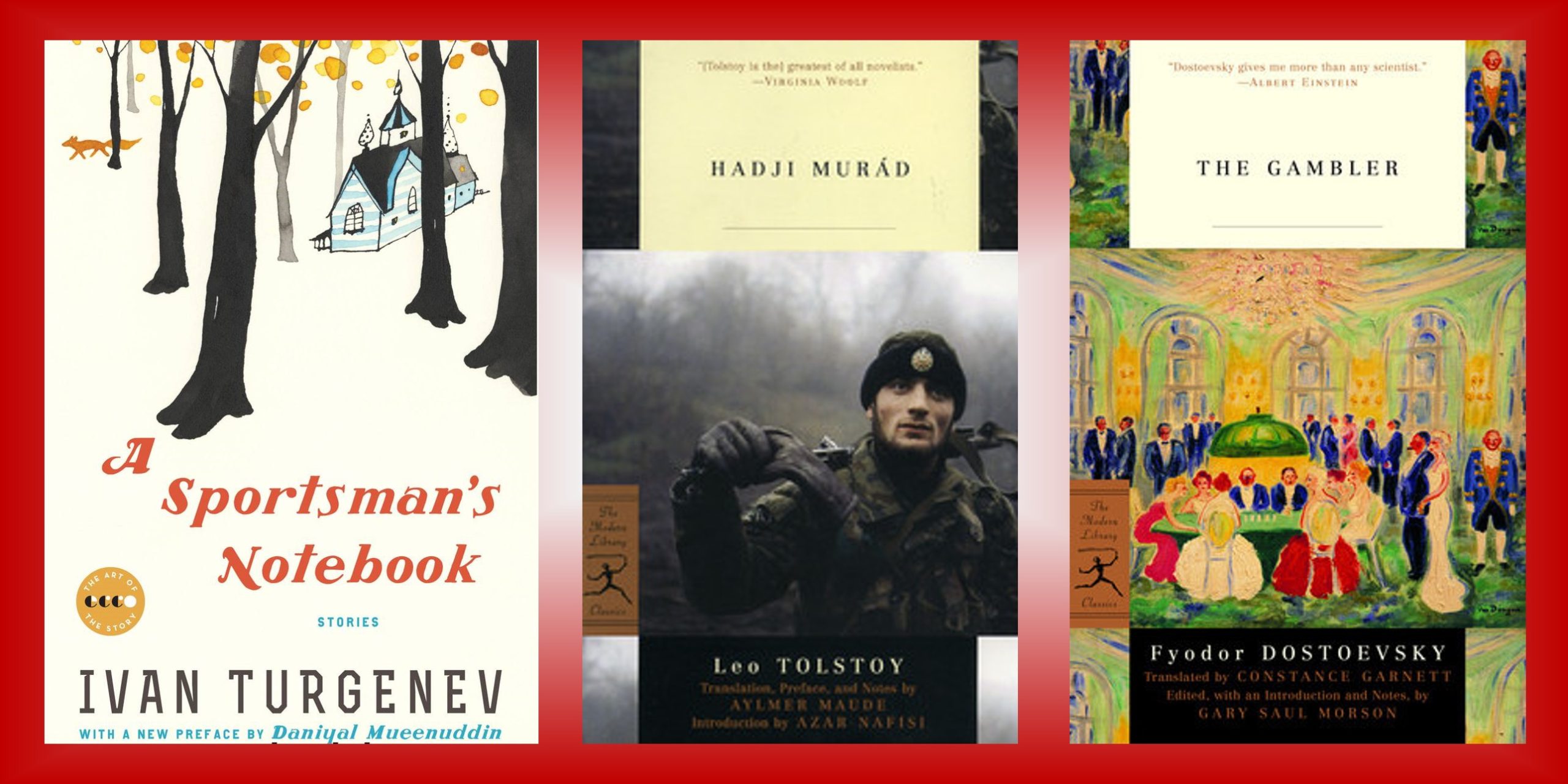
Another great writer, Truman Capote, gave me another applicable writing formula when he talked about writing In Cold Blood. "I am bringing fictional techniques to reportage."
I immersed myself totally within my chosen field. I was passionate and knowledgeable and continually excited about my little pie sliver of expertise: muscle, strength and how to acquire it.
I wrote of the men and events that populated this strange uber-masculine world. I was able to get paid to quiz my strength idols about how they morphed themselves! I was an insightful interviewer. I had a real point of view and I was, as Alfred Kazin once said of William Blake, "Like so many self-educated men, he was fanatically learned. But he read like a fundamentalist - to be inspired or refute." That was me cubed. I had a voice and a viewpoint and considerable life experience at a young age. Some writers are incredible technicians, but have no worthwhile life experiences to draw upon; others are real adventurers with tales worth retelling, yet they can't communicate.
I never sought to write "over my head" and I never sought to write about anything that I was not intimately familiar with. I wrote of the world of weights and lifting and men who excel at it and my episodic training treatises were recognized and well received right from the start.
Hugh Cassidy was instrumental in helping me shape my craft. He focused my thoughts in my initial articles. He tore my prose apart as surely as he tore me apart in the gym. He was a tough taskmaster who taught me that the goal was clear communication and communicating trumped trying to impress. See post on Hugh below.
In the intervening decade I continued a parallel course: furthering my own competitive aspirations while writing about what I learned from the world's best. I had ambitions and was driven to learn more and more and more. This made me an ideal interviewer. I knew my stuff and when I talked with athletes about their training they sensed immediately that I understood them. I created persuasive and compelling articles because I took the time to capture their idiosyncrasies, patois and mannerisms. I related with precision and care what it was about their training or nutrition that differentiated one great athlete from another.
I would suppose that it is no exaggeration to say that I have interviewed over 1,000 athletes about how and why they train the way that they do. About how and why they eat the way they eat. I also had the privilege of coaching hall-of-fame strength athletes, often in a very competitions at which they turned in their all-time best performances. Certain men, it seems, are driven to improve up the human body they are given. I was one of them.
What was it that drove myself and men like me?
What was it that I was writing about?
Was there an irreducible core question?
ANSWER: How best do we trigger physical transformation?
I made my bones by competing, by observing, by listening and by trying new things. I have come to a basic conclusion that in this day and age of unlimited choices and unlimited distractions. Some very important and productive strategies have been obfuscated, discarded or ignored. I have come full circle in my attitudes and choices and now feel certain that those who earnestly seek to transform themselves physically can benefit from using my Retro Man Methodology, much of what I first stumbled on as a boy-child.
Those ancient methods turned out to be timeless. If you scrape away all the different rationale and reasons people engage in fitness-related activities, the bottom line is that they want to modify their physique, change their body from what it is into what they want it to be. Being dissatisfied with their physical status quo, they will rearrange their lives and devote time, money and effort towards triggering transformation. In almost every case they fail miserably.
People who successfully transform physically transform psychologically. I've seen this phenomenon occur repeatedly: self image undergoes an astounding metamorphosis when a successful physical metamorphosis is achieved. People who make radical physical changes reinvent themselves, not just physically by psychologically and emotionally as well.
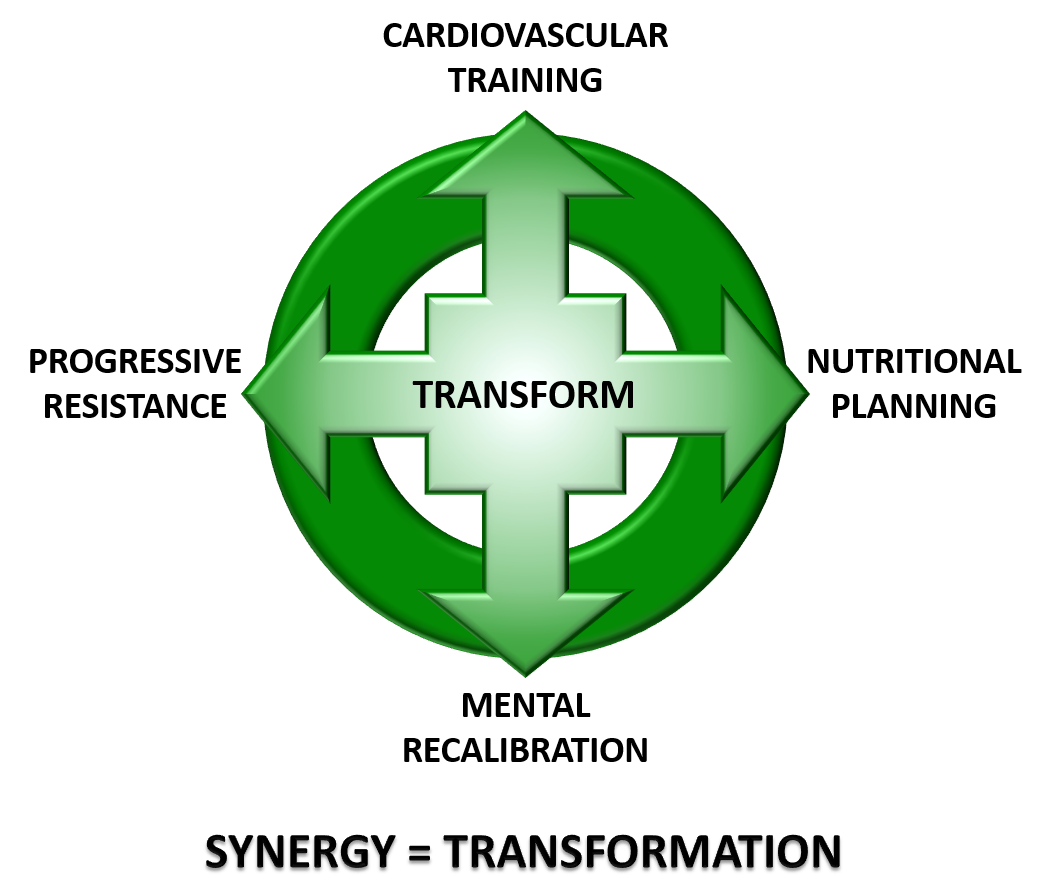
People nowadays chase their metaphorical tails in feverish pursuit of change, using fragmented and ineffectual methods. There are just too many choices and too many slick marketers with silky smooth raps that they relate with great conviction. They tell the gullible with pompous profundity that they have discovered a secret method. They disguise fallacious facts with absurd pseudo science and are seductive and persuasive.
People run in crazed circles all around the fitness Mulberry Bush, chasing one exotic mode, method, procedure or product after another. They all seek the mythical magic bullet of fitness: a method or mode that will enable them to effect a transformation without the disciplined deprivation, without the teeth-grinding physical effort, without the struggle.
Life is Struggle!
I love what my Purposefully Primitive brother-in-arms, Ori Hofmekler says, "Life in paradise should be rugged!" We are primordially programmed for struggle yet we seek to avoid struggle at all cost. Struggle is the precursor to true transformation: without struggle there is not transformation.
So many of my ancient adolescent epiphanies still ring true and still strike me as profound. Basic barbell and dumbbell exercises done with incredible intensity then backed up with lots of calories result in the construction of new muscle. If you are selective about ample calories you eat, if you practice periodic cardiovascular exercise, stored body fat is mobilized and oxidized. If eating and training are perfectly attuned to one another, synergy takes hold and results are dramatically accelerated.
To learn more about some of my mentors and successful strategies check out the posts below.
Learn more about our philosophies check out our site Functional Strength Join the community sign up below to our newsletter and receive our FREE Planning and Periodization Guide. Please feel free to send us a question here or leave a comment below.
Want the inside training scoop?
Join The Community
Our email content is full of value, void of hype, never pushy, and always free. As a BONUS you will receive our FREE planning & periodization template to help you with your training goals.





Hey Marty, Big Lou here, I was in the Army and lifted with you guys with my Army buddy Tom Benoit. Truly an honor to be exposed to all the greats at Chaillet’s gym above the Auto Parts store. I was a photographer in the Army and took lots of pics and some videos at Chaillet’s. How old were you when Mark went to the Worlds in Australia? I remember him getting sick and not lifting as he expected. Take care, Lou
From Marty: Hey Big Lou,
Mark was not at the Worlds in Australia in 1992. I was 42 at the time. Thanks for the question. I hope all is well with you.
Roy Patmalnee was my middle school teacher back in the late 90s. I’m pretty sure you’re writing about the same person. Incredible guy for sure.
Thanks for the feedback!